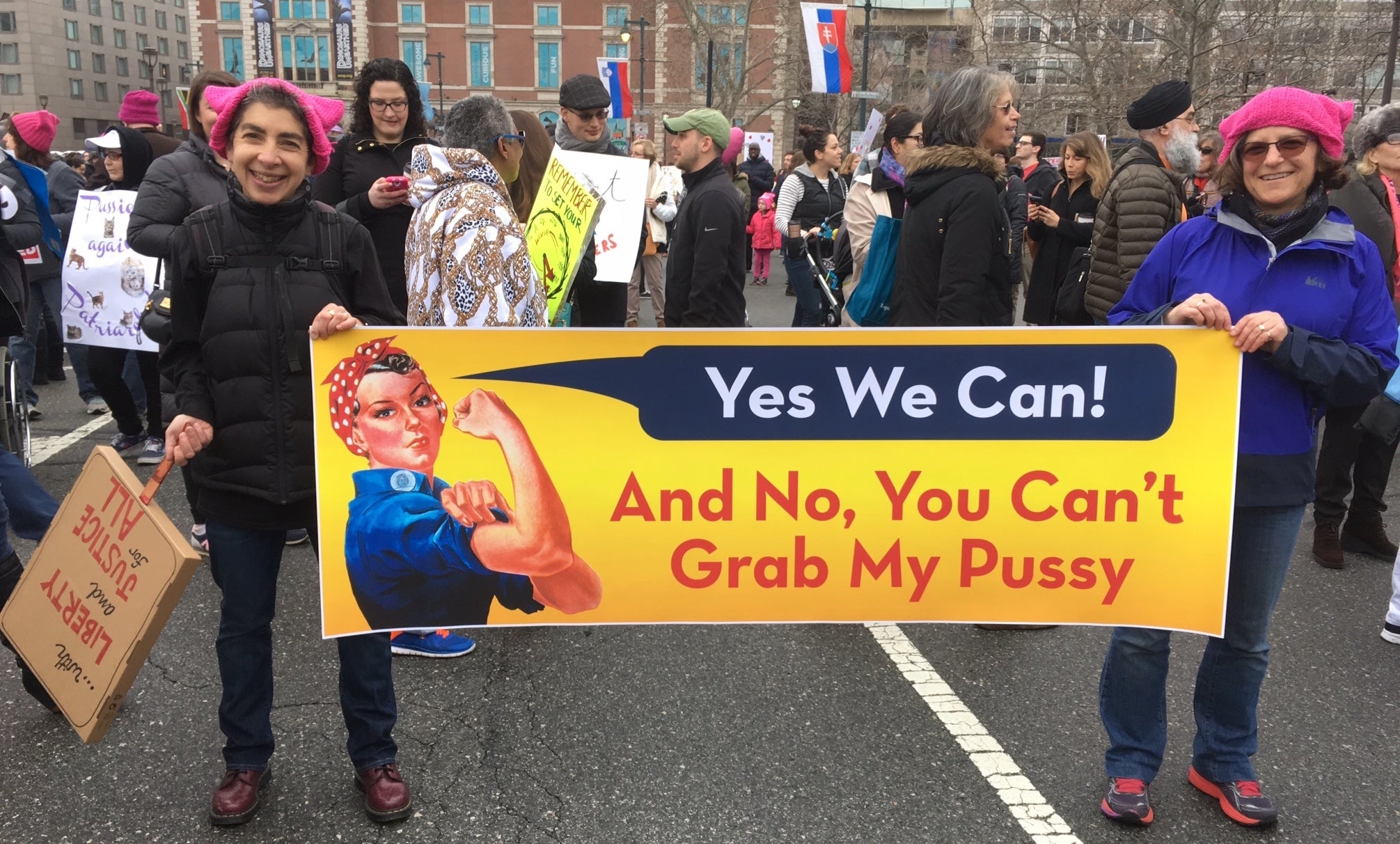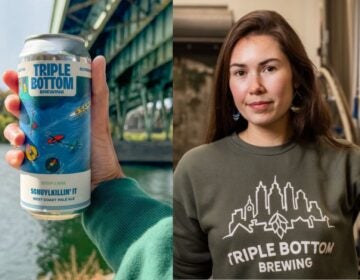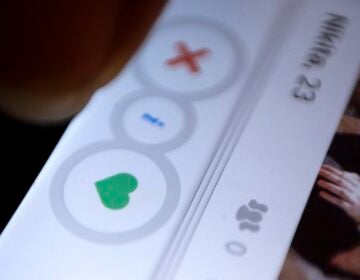The best way to walk through political adversity is hand in hand

The author (left) is shown holding a sign with her partner Elissa Goldberg. (Image courtesy of Anndee Hochman)
A child’s mitten was propped on the metal post of some outdoor shelving on Germantown Avenue. Bubblegum flag against all that winter gray. One hand waving hello.
It gave me hope.
The day before, I’d trudged up to Chestnut Hill on my usual round of errands — post office, bank, food co-op, Staples — and, somewhere along the way, managed to shed a pair of hand-knit, charcoal-hued, butter-soft mittens that I loved. Now I was tracing my footsteps in search of what I’d lost.
Had I taken them off at the co-op? I remembered admiring, but not touching, the greeny-ochre skin of a Gold Rush apple. A few doors away, at an eco-design shop, I’d lifted a stainless steel spork to check the price ($7, in case you’re interested). But when I asked, the clerk said no one had found mittens — just a single black leather glove he’d stashed near the register.
At the Pennsylvania General Store, where I’d considered a tea towel (at $20, too pricey) and a dark chocolate mini-replica of the LOVE sculpture (too meltable) for some friends in Oregon, the cashier looked near jars of artisanal mustard and a sampling tray of nonpareil candies, then shrugged.
Martin and Yolanda hunted behind the counter at Santander Bank and shook their heads. No luck at the post office either, where I must have been bare-fingered to peel my new stamps off their backing paper. “We found a dog, though. Want a dog?” the clerk asked, shaking a stuffed black terrier in my direction.
My head buzzed with clichés of attachment and absence: Better to have loved and lost than never to have loved at all. You don’t know what you’ve got till it’s gone. And this cruel chestnut: Finders, keepers; losers, weepers.
The Democrats lost on Nov. 8, and I’ve been weeping ever since. When I’m not raging, that is, or churning with a hot and palpitating anxiety about what these next years will bring. About the hurt that Trump’s belligerence and instability have already brought. In San Francisco, my nieces made signs to carry in Saturday’s march; one reads simply, heartbreakingly, “He’s so mean!”
How did we elect such a person? (Then I remind myself: Oh yeah, we didn’t — Hillary Clinton won the popular vote by nearly three million, enough people to fill Citizens’ Bank Park 68 times — and I feel those sickening clenches of sorrow and rage and anxiety all over again.)
I tromped toward home, fingers curled in the cramped pockets of my coat, wondering about the person who, no doubt, had stolen my gloves. Maybe, like me, she has lousy circulation, with extremities that turn white-lavender in the cold. Or maybe worse: knuckles scabbed from work, joints kinked by arthritis, no money for mittens.
Maybe, like so many Americans this election year, she’d grasped for the thing at hand, the easy thing, the irresistible promise of swift relief. Maybe she reached out in the kind of need that tramples thoughts of empathy or consequence, a desperation that overrides thought itself.
One more stop on my unappointed rounds. I’d ducked briefly into Staples the day before, and I’d surely been mittenless in order to swipe my credit card and press the green button on the machine. And there they were — a little heap of marled black yarn with purple trim — behind the main counter, flopped next to a blue lanyard holding a jangle of forgotten keys.
“Can I help you?” asked a very pregnant cashier. I pointed. “I left my mittens here yesterday. There they are.” She eased herself off the stool, fetched my mittens and sat down again, sighing with effort and relief.
“Nothing’s lost forever. In this world, there is a kind of painful progress,” Tony Kushner wrote in his epic, extravagant “Angels in America.” I want to believe that, just as I wanted to believe President Obama when he reminded us, two days before the inauguration, “The only thing that is the end of the world is the end of the world.”
I cried, listening to his final briefing in the White House press room. (You don’t know what you’ve got till it’s gone.) And I cried six days before that, listening to a “TED Radio Hour” episode with Suzanne Simard, a professor of forest ecology, who believes we’ve been seeing the forest all wrong. Her research shows that the birches, pines, and firs aren’t competing in some ancient Darwinian scuffle for sunlight, water, and nitrogen. They’re actually cooperating: sharing defense enzymes, nurturing injured saplings, helping each other grow. They’re smart, these trees. They talk to each other.
We now have a president who, having won, lusts only to keep winning. It is the only game he knows. But we, the people, must know better. Zero-sum has never been a strategy that saves our lives. I’m with Kushner, and Obama, and the forest: the history of our peoples, our planet, as a long, anguished, effortful, imperfect lean toward inclusion, generosity, and love.
So I’ll keep walking. I marched on Saturday, of course, with my banner (thank you, San Francisco family, for the inspired design) of Rosie the Riveter and her popped bicep with the slogan, “Yes, we can! And no, you can’t grab my pussy!”
And I’ll keep sauntering through my neighborhood, the interdependent nexus where I can get nearly everything a person needs: library book, oil change, Pap smear, deck stain, bottle of Pinot Noir. The neighborhood where, in the grief-fogged weeks after my father died, when I left my groceries at the bank and my keys at the post office, I would come home to a message from the gentle-voiced Yolanda: “Anndee, we have your bananas right here. We’ll be open until 4.”
On the scale of catastrophe, the 2016 election stands somewhere between lost mittens and the end of the world. This is how we will move through it: Like the trees, whispering their urgent underground communiqués. Like the earth, slowly groaning forward.
So head outside. Hunt for signs of solidarity and glee: that child in the red cap shrieking from a playground swing. The old man licking a double cone of mint ice cream. Someone posting a flier for an “Indivisible” group, happening right near you. Look out especially for the ones blinkered by sorrow, numbed by fear of losing health care or housing or their tentative foothold in these United States. Hang onto your mittens. Better yet, reach for someone else’s ungloved hand. It’s going to be a chilly night.
WHYY is your source for fact-based, in-depth journalism and information. As a nonprofit organization, we rely on financial support from readers like you. Please give today.



